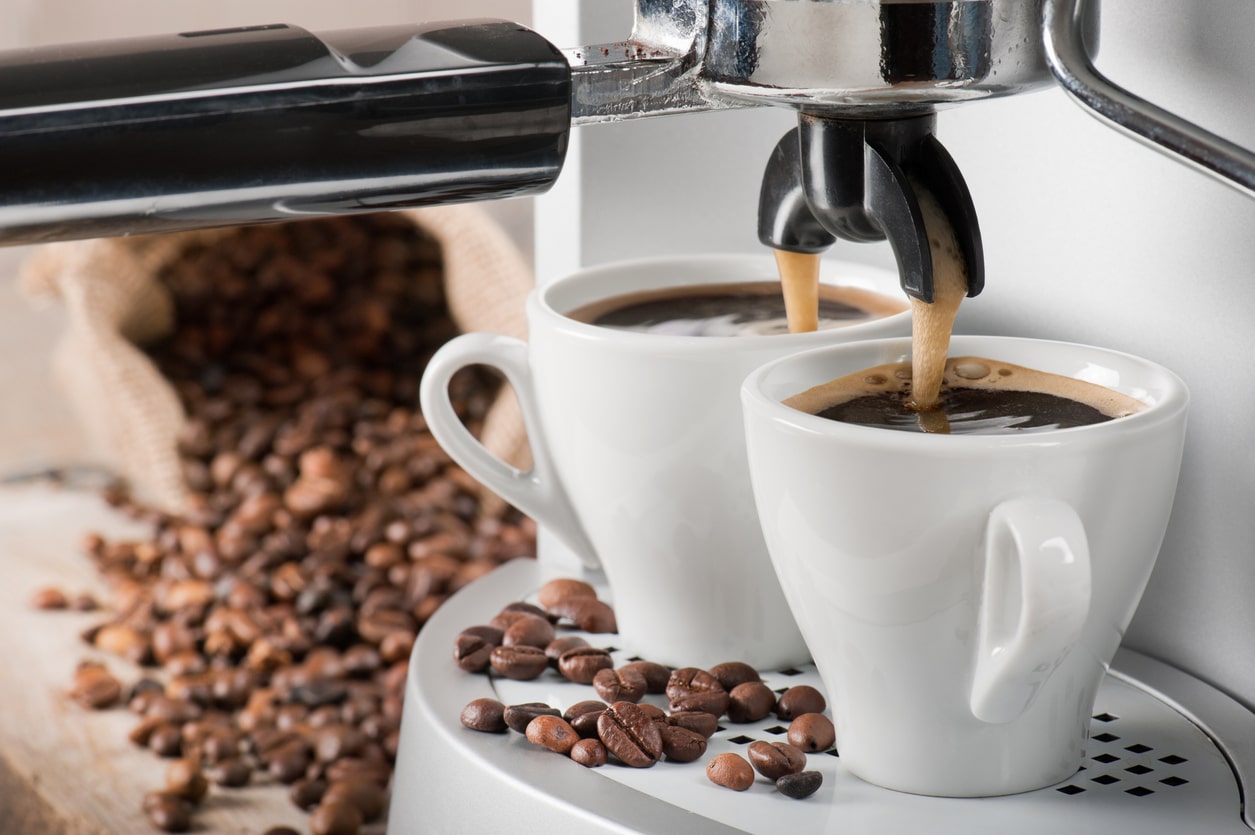
How much caffeine in a coffee?
Coffee is one of the world´s favourite drinks. Its aroma and flavour are intoxicating, but coffee is also valued for its benefits to the body and its reinvigorating properties. The wide range of preparation methods available nowadays mean all tastes are catered for.
However you prefer to consume it, for a successful relationship with coffee, it´s a good idea to be familiar with its benefits, and also with the effects of the caffeine it contains and the recommended limits. We´re often asked which contains more caffeine, pods, moka or filter coffee; we´ll try and clarify in this brief explanation of how much caffeine is in a coffee.
Caffeine: effects and quantities contained in coffee
One of the active ingredients of coffee is caffeine, an alkaloid which is present in varying amounts in coffee, but also in other substances like tea or chocolate. The effect of caffeine is effectively to stimulate the central nervous system, with a direct impact on the mind and the entire organism.
It is therefore important to know how much coffee we should consume in a day, so that we get the very best of the energising and toning effects of this exquisite beverage. The caffeine content in a cup of coffee is affected by several variables, such as the coffee variety used and its provenance (Robusta, Arabica etc) and the extraction method, water temperature, coffee roasting profile and grind.
In all these cases, it is possible to calculate approximately the quantity of caffeine contained in each type; this allows us to drink only the amount that is beneficial and avoid negative consequences for mind and body.
There are numerous varieties of Arabica and Robusta coffee, and each variety contains a different amount of caffeine.
One of the determining factors of caffeine levels is definitely the grind: a finer texture allows easier and more thorough extraction and therefore increases the caffeine levels. An espresso extracted with a much finer grind will therefore have a higher level of caffeine compared, for example, with a filter coffee made with a coarser grind. However, this is all relative, because although it´s true that espresso contains more caffeine, it´s also true that a cup of filter coffee usually contains considerably more, meaning that the two are practically equivalent.
Read more: The differences between Arabica and Robusta coffee
Amount of caffeine in an espresso
A cup of espresso may contain between 25 and 35 ml of coffee, and therefore between 30 and 50 mg of caffeine. The milligrammes of caffeine in an espresso may vary widely, depending on the factors mentioned above, and can reach approximately 100 mg per cup.
Amount of caffeine in Moka coffee
A cup of coffee prepared in a moka pot usually contains more coffee than a normal espresso - i.e. approximately 50 ml, partly because when we make coffee at home, we tend to use a larger pot than the bar, and serve a larger quantity of coffee.
What´s more, the extraction time for coffee made at home in the classic moka is longer than for espresso. A coffee made in a moka contains around 60 mg of caffeine.
Amount of caffeine in capsules or pods
Coffee in pods or capsules usually contains a far lower amount of caffeine than the classic moka coffee, with positive consequences for anyone who needs to avoid excess caffeine for health reasons.
On average, a capsule contains between 50 and 65 mg of caffeine, but here again the variety of coffee has an impact on this, and some capsules contain 70-80 mg of caffeine.
Amount of caffeine in filter coffee
We tend to think that filter coffee or American coffee is "lighter" because it has a less intense flavour and contains a large amount of water. However, we should bear in mind that filter coffee is usually served in 250 ml cups, so the caffeine content is more or less the same as for moka coffee.
The caffeine in a filter coffee may even reach 150 mg. But, as ever, this may change according to the actual capacity of the cup and the amount of coffee consumed.
How many coffees should we drink in a day?
One of the most widespread questions among inveterate coffee lovers is how many cups we can drink in a day without negative effects on our health. According to the European Food Safety Authority (EFSA), which has conducted in-depth studies in this area, the daily dose of caffeine accepted by the body without difficulty is between 200 and 400 mg.
So, bearing in mind the caffeine content in one coffee, this means we can drink approximately five cups a day to enjoy all the benefits of coffee without worrying.
Read more: How to make a good coffee
Effects and benefits of caffeine
The most valued property of caffeine is its ability to stimulate the mind and tone the nervous system and the cardio-vascular system. What´s more, caffeine also acts on gastric and bile secretions and, when taken after meals, can have a positive effect on digestion.
Caffeine is not the only beneficial substance contained in coffee: this exotic beverage also contains numerous vitamins, including B2, B3 and B5. A cup of coffee also contains plenty of minerals such as manganese, magnesium and potassium. Particularly valued by those who follow a specific diet is the feeling of fullness provided by coffee and its lipolytic effect, i.e. its ability to stimulate body fat to facilitate thermogenesis, burn calories and provide the correct amount of energy to the body.
Where to find good coffee?
Now we´ve discovered the positive properties of coffee and the maximum amount of caffeine recommended in our daily diet, it´s essential to choose only the best coffees on the market, so that we can enjoy a pleasure that´s beneficial and truly satisfying for the tastebuds.
In the Caffè Corsini online shop you can buy the very best coffee in beans or ground, but also filter coffee, pods and capsules compatible with Nespresso, Dolce Gusto and A Modo Mio coffee machines.
Since 1950, Corsini has worked to select only the best varieties of beans, offering connoisseurs a high-quality coffee experience.
Coffee producers since 1950, Corsini boasts long experience and, above all, a wide range of superior quality blends.
However you prefer to consume it, for a successful relationship with coffee, it´s a good idea to be familiar with its benefits, and also with the effects of the caffeine it contains and the recommended limits. We´re often asked which contains more caffeine, pods, moka or filter coffee; we´ll try and clarify in this brief explanation of how much caffeine is in a coffee.
Caffeine: effects and quantities contained in coffee
One of the active ingredients of coffee is caffeine, an alkaloid which is present in varying amounts in coffee, but also in other substances like tea or chocolate. The effect of caffeine is effectively to stimulate the central nervous system, with a direct impact on the mind and the entire organism.
It is therefore important to know how much coffee we should consume in a day, so that we get the very best of the energising and toning effects of this exquisite beverage. The caffeine content in a cup of coffee is affected by several variables, such as the coffee variety used and its provenance (Robusta, Arabica etc) and the extraction method, water temperature, coffee roasting profile and grind.
In all these cases, it is possible to calculate approximately the quantity of caffeine contained in each type; this allows us to drink only the amount that is beneficial and avoid negative consequences for mind and body.
There are numerous varieties of Arabica and Robusta coffee, and each variety contains a different amount of caffeine.
One of the determining factors of caffeine levels is definitely the grind: a finer texture allows easier and more thorough extraction and therefore increases the caffeine levels. An espresso extracted with a much finer grind will therefore have a higher level of caffeine compared, for example, with a filter coffee made with a coarser grind. However, this is all relative, because although it´s true that espresso contains more caffeine, it´s also true that a cup of filter coffee usually contains considerably more, meaning that the two are practically equivalent.
Read more: The differences between Arabica and Robusta coffee
Amount of caffeine in an espresso
A cup of espresso may contain between 25 and 35 ml of coffee, and therefore between 30 and 50 mg of caffeine. The milligrammes of caffeine in an espresso may vary widely, depending on the factors mentioned above, and can reach approximately 100 mg per cup.
Amount of caffeine in Moka coffee
A cup of coffee prepared in a moka pot usually contains more coffee than a normal espresso - i.e. approximately 50 ml, partly because when we make coffee at home, we tend to use a larger pot than the bar, and serve a larger quantity of coffee.
What´s more, the extraction time for coffee made at home in the classic moka is longer than for espresso. A coffee made in a moka contains around 60 mg of caffeine.
Amount of caffeine in capsules or pods
Coffee in pods or capsules usually contains a far lower amount of caffeine than the classic moka coffee, with positive consequences for anyone who needs to avoid excess caffeine for health reasons.
On average, a capsule contains between 50 and 65 mg of caffeine, but here again the variety of coffee has an impact on this, and some capsules contain 70-80 mg of caffeine.
Amount of caffeine in filter coffee
We tend to think that filter coffee or American coffee is "lighter" because it has a less intense flavour and contains a large amount of water. However, we should bear in mind that filter coffee is usually served in 250 ml cups, so the caffeine content is more or less the same as for moka coffee.
The caffeine in a filter coffee may even reach 150 mg. But, as ever, this may change according to the actual capacity of the cup and the amount of coffee consumed.
How many coffees should we drink in a day?
One of the most widespread questions among inveterate coffee lovers is how many cups we can drink in a day without negative effects on our health. According to the European Food Safety Authority (EFSA), which has conducted in-depth studies in this area, the daily dose of caffeine accepted by the body without difficulty is between 200 and 400 mg.
So, bearing in mind the caffeine content in one coffee, this means we can drink approximately five cups a day to enjoy all the benefits of coffee without worrying.
Read more: How to make a good coffee
Effects and benefits of caffeine
The most valued property of caffeine is its ability to stimulate the mind and tone the nervous system and the cardio-vascular system. What´s more, caffeine also acts on gastric and bile secretions and, when taken after meals, can have a positive effect on digestion.
Caffeine is not the only beneficial substance contained in coffee: this exotic beverage also contains numerous vitamins, including B2, B3 and B5. A cup of coffee also contains plenty of minerals such as manganese, magnesium and potassium. Particularly valued by those who follow a specific diet is the feeling of fullness provided by coffee and its lipolytic effect, i.e. its ability to stimulate body fat to facilitate thermogenesis, burn calories and provide the correct amount of energy to the body.
Where to find good coffee?
Now we´ve discovered the positive properties of coffee and the maximum amount of caffeine recommended in our daily diet, it´s essential to choose only the best coffees on the market, so that we can enjoy a pleasure that´s beneficial and truly satisfying for the tastebuds.
In the Caffè Corsini online shop you can buy the very best coffee in beans or ground, but also filter coffee, pods and capsules compatible with Nespresso, Dolce Gusto and A Modo Mio coffee machines.
Since 1950, Corsini has worked to select only the best varieties of beans, offering connoisseurs a high-quality coffee experience.
Coffee producers since 1950, Corsini boasts long experience and, above all, a wide range of superior quality blends.
Blog posts

coffeetips
All types of tea: a comprehensive guide to varieties
The world of tea types is a complex d...
Read more

